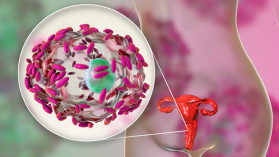Get Informed Topics Safer Sex & STIs Types of STIs Hepatitis B
Hepatitis B
What is Hepatitis B?
- Hepatitis B is a sexually transmitted infection (STI) caused by a virus that affects the liver.
- You can be vaccinated against Hepatitis B.
How do you get Hepatitis B?
- Hepatitis B is found in certain bodily fluids of someone who has hepatitis B: semen (cum), vaginal fluid, anal fluid and blood. Contact with any of these fluids can put you at risk of getting Hepatitis B.
- You can get Hepatitis B if you have unprotected oral, vaginal or anal sex with someone who has Hepatitis B.
- You can get Hepatitis B if you share sex toys with someone who already has it and you don’t disinfect the toys or put a new condom on them each time a new person uses the toys.
- You can get Hepatitis B if you share needles or other drug use equipment with someone who has Hepatitis B. Cleaning drug equipment with bleach does not prevent Hepatitis B.
- A pregnant person with Hepatitis B can pass it on to their baby during vaginal delivery.
- You can get Hepatitis B from any unsterilized tools used during activities that cut the skin such as tattooing or piercing.
- You can also get Hepatitis B from sharing personal items like toothbrushes or razors with someone who has the virus because these items may have blood on them.
- You cannot get Hepatitis B from water, food or casual contact.
How do you know if you have Hepatitis B?
- The only way to know you have Hepatitis B is to get tested.
- Most people do not have any symptoms and may not know they have it. You can pass on Hepatitis B even if you don’t have any symptoms.
- If symptoms do occur, they usually appear within 6 weeks to 6 months after you got Hepatitis B.
- Symptoms can include:
- feeling tired
- pain in the abdomen (belly)
- yellowing of the skin
- lack of appetite
- nausea, a rash
- joint pain
- dark coloured urine (pee)
- pale stools (poop)
- The most common symptom of Hepatitis B is no symptom at all.
- About 90% of people who get Hepatitis B clear the virus within 6 months and develop a natural immunity to the virus. This means their body is protected from getting Hepatits B in the future and they cannot pass the virus on to someone else after they have cleared it.
- About 3-10% of people who get Hepatitis B do not clear the virus. Sometimes called “carriers”, they have chronic Hepatitis B. This means they will always have Hepatitis B and can give it to other people. Most carriers do not have symptoms but may develop liver problems later in life.
How and where can you get tested for Hepatitis B?
- You can get tested for hepatitis B in most public or private health facilities in your area. Find a clinic near you in the clinic finder here (Link)
- A blood test is used to test for Hepatitis B.
- If you want to be tested for Hepatitis B, ask specifically for a Hepatitis B test. Do not assume you will be tested for Hepatitis B, even if you ask to be tested “for everything” or “every STI”.
- A pregnant person can pass Hepatitis B on to their baby during vaginal delivery. If you are pregnant and have not been tested for Hepatitis B, talk to your prenatal care provider.
- What if you test positive for Hepatitis B?
- If you test positive for Hepatitis B, it means you have it.
- If you test positive for Hepatitis B, further blood tests will be done to evaluate how well your liver is working.
- There is currently no cure for Hepatitis B. However, most people who get the virus recover completely within 6 months and are protected from getting it again in the future by their own natural immunity. A follow-up blood test will be done to determine whether or not you have cleared the virus.
- You can be vaccinated against Hepatitis B to prevent getting the virus.
- Chronic Hepatitis B increases the risk of liver damage, including cirrhosis and liver cancer. People who don’t clear the virus or carriers can use medications to help manage life-long Hepatitis B and should have regular check-ups with their clinician.
- It is important that you tell any recent sexual partners (in the last six months) that you are being treated for Hepatitis B, so that they go for treatment too.
- Some clinics may also offer to contact your partner using what’s called a ‘contact slip’. This is to inform them they may have been exposed and to recommend they get tested but it doesn’t mention your name.
.
How can you lower your risk of getting Hepatitis B and/or passing it on to your partner(s)?
- Make informed decisions. Talk to your partner(s) about STIs and the use of safer sex tools, such as condoms.
- Use condoms on penises or dildos for vaginal or anal sex, use latex gloves for finger play and fisting, and use condoms/dams for oral sex to lower your chances of getting or transmitting Hepatitis B.
- If you are sharing sex toys, be sure to disinfect them or put a new condom on them when a new person uses the toys.
- Cleaning drug equipment with bleach does not prevent Hepatitis B. Use a new needle every time.
- For tattooing, piercing and other activities that cut the skin, make sure the tools are new each time or have been properly sterilized.
- If you are sharing pipes, consider using lip balm to prevent chapped and/or cracked lips.
- Get vaccinated to protect yourself from Hepatitis B. A vaccine is an injection (shot) that prevents you from getting the virus. The Hepatitis B vaccine consists of 3 shots, given over a 6 month time period.
- If you were not vaccinated for Hepatitis B and would like to be, you can get vaccinated at most sexual health clinics. Depending on your health history, you may be able to get the vaccine for free. You can also buy a vaccine that will protect you from both Hepatitis A and B at the same time. Talk to your clinician for more information.
- If you are pregnant and have Hepatitis B, there are ways you can significantly reduce the risk of your baby having Hepatitis B if you have your baby vaccinated immediately after delivery. Talk to your pre-natal care provider for more information.
- If you are a Hepatitis B carrier, you can protect your partner by recommending they get vaccinated for Hepatitis B.
- If you are a Hepatitis B carrier, avoid sharing personal items such as razors and toothbrushes as these items may have blood on them.
- Get tested for Hepatitis B if you have not been vaccinated and other STIs when you or your partner has a new sexual partner. Or, if you have new partners often, get STI testing every 3-6 months. If you have symptoms of Hepatitis B or another STI, get tested right away.
Partner Notification
- If you are diagnosed with Hepatitis B, it is important that you or someone from the public health department notify your past sexual partners so they can be tested and treated. Your name is not disclosed when a sexual partner is contacted.
Frequently Asked Questions
Male Body
1 questions
See frequently asked questions on Male Body
Let's Talk
Facts, tips, stories and common questions
Go to Forum




